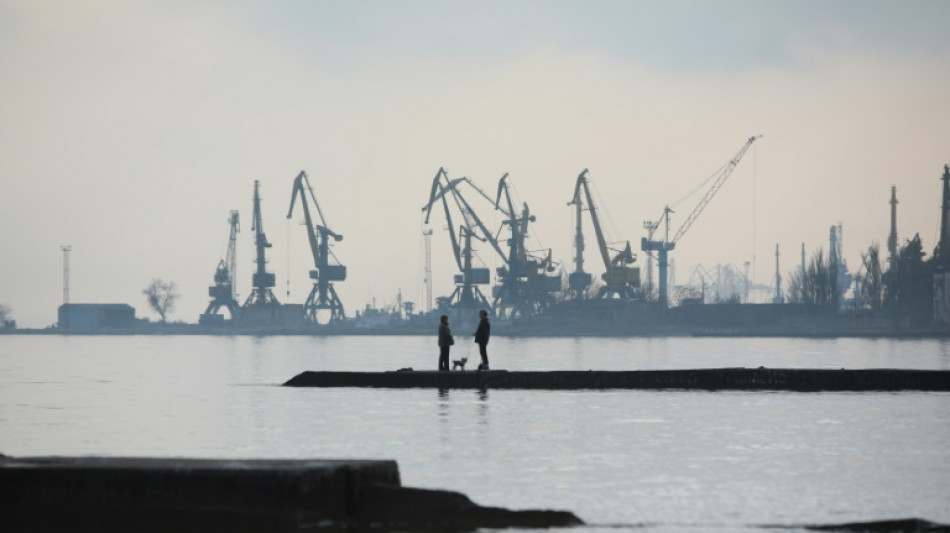

Ukraine evacuates port city Mariupol besieged by Russian forces
The Ukrainian port city of Mariupol was to evacuate residents Saturday after invading Russian forces declared a temporary ceasefire to open a corridor for civilians to flee one of the war's fiercest battles.
Russia had blockaded the strategic city, which proudly resisted a siege by Moscow-backed rebels during a 2014 conflict only to find itself again a target, and cut off electricity, food, water and heating in the dead of winter.
The evacuation will be seen as a prelude to a final assault by Russian forces that, if successful, would see their invading army pushing north from occupied Crimea link up with their force from the east and win control of Ukraine's coast on the Sea of Azov.
After the Russian defence ministry declared a ceasefire to allow "humanitarian corridors" out of Mariupol and neighbouring Volnovakha, Mariupol officials announced on social media that the city's 450,000-strong population could begin to leave by private transport from 0900 GMT.
The siege of Mariupol came as more Russian forces inched closer to the capital Kyiv, encountering stiff resistance and shelling civilian areas in the western suburbs and the northern town of Chernihiv, where there have been heavy civilian casualties in recent days.
A group AFP of reporters who visited the town on Saturday saw scenes of devastation -- despite Moscow's insistence that it is not targeting civilian areas -- and fears are rising in Kyiv that the capital will suffer the same fate once Russian missile artillery is deployed within range.
Ukraine's defence minister Oleksiy Reznikov alleged that Russia had changed its tactics after encountering tough Ukrainian resistance that had defeated its apparent plan to quickly storm major cities and overthrow President Volodymyr Zelensky's government.
"Yes, the enemy has advanced in some directions, but it controls only a small area. Our defenders are repelling and ousting the occupiers," he said, in a Facebook post.
"The aggressor comprehensively and actively uses its air and missile potential. Aviation of all kinds bombards cities, towns and civilian infrastructure," he said, dubbing the Russian army "cowardly" and only able to attack "children, women, unarmed civilians."
Since President Vladimir Putin's army invaded on February 24, Russia has pummelled Ukrainian cities, killed hundreds of civilians and even assaulted Europe's largest atomic power plant, sparking fears of a catastrophic nuclear accident.
Moscow has seized two key cities in its 10-day-long invasion, Berdiansk and Kherson on Ukraine's southern Black Sea coast.
But capturing Mariupol would represent a bigger prize for Russian forces as it would deal a severe blow to Ukraine's maritime access and connect troops coming from annexed Crimea and the Donbas.
Kremlin spokesperson Dmitry Peskov said late Friday that Moscow was waiting for a third round of talks with Ukraine in Belarus, and one of Kyiv's negotiators said it hoped to hold them this weekend.
"The third leg could take place tomorrow or the day after, we are in constant contact," Ukrainian presidential advisor Mykhailo Podolyak said Friday.
In a hospital in the Ukrainian capital, wounded soldiers told AFP of their grim battle against the Russian advance, and vowed to return to the frontline.
"We were on reconnaissance and came across an enemy column that had made a breakthrough," said Motyka, 29, who was hit by shrapnel on his right side.
"We fought them and killed their soldiers on foot, but they showered us with mortar fire."
Zelensky was to appeal to Washington for more assistance Saturday. He will address the US Senate as some lawmakers urged President Joe Biden to take tougher measures, including banning Russia's oil imports.
- No no-fly zone -
Zelensky had earlier criticised NATO for ruling out imposing a no-fly zone, saying the Western military alliance had essentially given "the green light for further bombing of Ukrainian cities and villages".
With fears growing of direct conflict between Western forces and Russia -- both nuclear armed -- the US and Moscow have set up a new direct phone line to reduce the risks of "miscalculation," the Pentagon said Friday.
Russian forces attacked and seized the Zaporizhzhia nuclear plant on Friday, pushing Kyiv to accuse Moscow of "nuclear terror".
Ukrainian monitors say there has been no spike in radiation after a fire in a training facility.
Moscow denied it had shelled the plant.
- Media exodus -
In an apparent response to the unrest, Russian authorities have imposed a news blackout and several media outlets have halted operations.
Multiple media websites, including the BBC, were partially inaccessible in Russia. Twitter was restricted and Facebook blocked.
The BBC and Bloomberg said they were suspending work in Russia after lawmakers in Moscow approved legislation to impose fines and jail terms of up to 15 years for anyone publishing "fake news" about the army.
"This legislation appears to criminalise the process of independent journalism," BBC Director-General Tim Davie said in a statement.
CNN said it would halt broadcasting in Russia, while independent Russian newspaper Novaya Gazeta said it would remove Ukraine content in the wake of the new law.
- 'Whole world against you' -
Putin has been unmoved as Russia has become isolated in the economic, sporting and cultural fields.
But UN prosecutors at The Hague are investigating a possible war crime in the eastern city of Kharkiv, where authorities say residential areas were indiscriminately shelled.
In Geneva, the UN Human Rights Council voted to create a top-level investigation into violations committed in the invasion.
The UN says more than 1.2 million refugees have flooded into neighbouring countries.
The global body's food agency has warned the conflict will create a food crisis in Ukraine and worsen global food insecurity, with Moscow and Kyiv providing around 29 percent of the global wheat trade.
(A.Laurent--LPdF)




